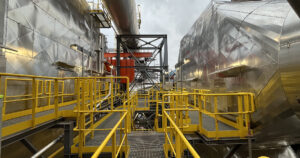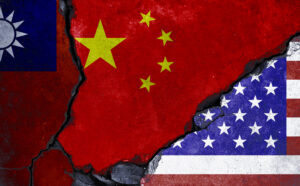
Nova Poshta, the leader in express delivery in Ukraine and part of the Nova Group, processed 2.41 million shipments in a single day on December 22, exceeding the previous record of 2.25 million set on December 23, 2024, by 7.1%, the company announced on Friday.
“This is a joint record for the company and our customers, in particular entrepreneurs whose goods we delivered and who, despite all the challenges and difficult conditions, continue to work and support our country’s economy,” said Volodymyr Poperechnyuk, co-owner of Nova Poshta, in a press release on Friday.
It is noted that in 2023, the record day was December 18, when the company processed 2.01 million parcels throughout Ukraine.
The company added that on peak days in December, more than 1,000 additional colleagues from the office were involved in processing parcels.
“Nova Poshta has a pre-New Year tradition when support office employees join the work in branches, at terminals, in fulfillment, as couriers, and as contact center operators,” the company said.
Nova Poshta previously reported that in the first half of 2025, it delivered 238 million parcels and cargoes, which is 7% more than in the same period in 2024, as well as 5.9 million international parcels.
As of October 6, the leader in express delivery in Ukraine had 44,983 service points, including 14,336 branches and 30,647 parcel terminals. In the first half of this year, the branch network grew by 708 points to 13,985, and the number of parcel terminals increased by more than 4,000 to 28,326.
Nova Poshta’s consolidated net profit for January-September 2025 increased by 35.1% compared to the same period last year, to UAH 2 billion 876.38 million, consolidated net income – by 21.7%, to UAH 45 billion 727.67 million.
The main activity of Nova Poshta is express delivery of documents, parcels, and palletized large-sized cargo.

Ukraine has joined the group of countries with the highest level of maturity of digital public administration according to the updated GovTech Maturity Index 2025 (GTMI) of the World Bank, according to the published report of the organization.
According to the report, GTMI 2025 covers 197 economies and divides them into four groups according to the level of GovTech development: A – Extensive, B – Significant, C – Medium and D – Low.
Ukraine is assigned to Group A, which includes 80 states demonstrating the most advanced solutions in the sphere of digital public services, basic information systems, open data and digital interaction with citizens.
The document notes that over the period from 2022 to 2025, the share of Group A countries has increased and the gap between leaders and outsiders of digital transformation of the public sector has widened. Europe and Central Asia as a whole remains one of the most mature regions in terms of GovTech.
Earlier, the researchers pointed out that Ukraine has significantly improved its performance in recent years and moved from Group B to Group A on the GovTech index, reflecting progress in the digitalization of public services, the introduction of electronic document management systems and the development of open data.

This week, the Ukrainian market continued to see a gradual decline in feed corn prices on a FOB Black Sea basis, according to the information and analytical agency APK-Inform.
“Prices remained under pressure throughout the week due to slow sea export rates as a result of systematic attacks by the Russian Federation on Ukraine’s port and energy infrastructure, which led to shipment disruptions, which, in turn, restrained importers’ demand,” analysts said.
At the same time, they noted that corn remains the most active export crop for Ukraine, but this has not been able to offset the factors putting pressure on prices.
Indicative bid/ask prices for feed corn with delivery in December-January from Black Sea ports fell by 1-3 USD/ton in less than a week under the influence of these factors to 210-218 and 214-222 USD/ton, respectively, according to APK-Inform.

The Kryvyi Rih Mining and Metallurgical Plant PJSC ArcelorMittal Kryvyi Rih (AMKR, Dnipropetrovsk region) has created an autonomous heating system for its coke production facility (CPF) to save energy and improve energy efficiency.
According to information from the primary organization of the Trade Union of Workers in the Metallurgical and Mining Industry of Ukraine (PO PMGU) AMKR on its website, energy specialists have completed a project to create an autonomous heating system at the CCF.
At the same time, with reference to the head of the KHV energy department, Alexander Melnikov, and the head of the steam supply section of the department, Dmitry Khvorostinin, it is specified that previously, heating water for the heating system at KHV was supplied from a neighboring metallurgical production facility. However, in order to use energy resources more rationally and prevent unjustified heat losses, KHV Director Nikolai Galushkin proposed introducing autonomous heating that would operate on the principle of complete self-sufficiency.
Almost everything needed to create an autonomous heating system was found at the enterprise. The largest component of the new system, a storage tank for heating water, had previously been used at the chemical plant.
The heat transfer medium supplied to the heating system was chemically purified water produced at the chemical plant, and it was decided to use low-pressure steam produced in-house to heat it. As a result, a closed-cycle system was created, which is as energy-efficient as possible. Appropriate metering devices were installed to control and regulate the pressure and temperature of the heat transfer fluid.
ArcelorMittal Kryvyi Rih is the largest producer of rolled steel in Ukraine. It specializes in the production of long products, in particular, rebar and wire rod. The company has a full production cycle, with a production capacity of over 6 million tons of steel, more than 5 million tons of rolled products, and over 5.5 million tons of pig iron per year.
ArcelorMittal owns Ukraine’s largest mining and metallurgical complex, ArcelorMittal Kryvyi Rih, and a number of small companies, including ArcelorMittal Beryslav.

The Chinese Foreign Ministry announced sanctions against 10 individuals and 20 US defense companies in response to the latest US arms deliveries to Taiwan. This was stated in a statement by the Chinese Foreign Ministry, released on Friday and quoted by Reuters.
The restrictions apply, in particular, to Boeing in St. Louis, as well as a number of other US defense contractors. The sanctions include freezing any assets of companies and individuals in China and prohibiting Chinese legal entities and individuals from doing business with them. In addition, executives on the sanctions list are barred from entering mainland China, as well as Hong Kong and Macau.
Beijing linked the decision to Washington’s approval of a large package of arms supplies to Taiwan worth more than $10 billion, including HIMARS multiple launch rocket systems, artillery, and other types of weapons to strengthen the island’s defenses.
The Chinese authorities have stated that they consider US arms supplies to be interference in the internal affairs of the PRC and a violation of the “one China” principle, promising to continue to take “decisive measures” in response to the arming of Taiwan.
The Experts Club think tank previously compared the military capabilities of China and Taiwan. For more details, see https://www.youtube.com/shorts/kFdxOOC4_Ss

Metinvest Group has won the UN Global Compact Partnership for Sustainability Award 2025 in Ukraine in the “Reconstruction of Ukraine” category for creating the first underground steel hospital on the front line.
According to the company’s press release, the Partnership for Sustainability Award is the most prestigious award in the fields of corporate sustainability and ESG (environment, social responsibility, and governance). The annual award recognizes the best partnership projects implemented by business, government, and society. These projects are aimed at achieving Sustainable Development Goals, protecting the environment, overcoming social and economic challenges, and promoting peace. Since 2018, the award has brought together more than 600 cases of successful partnerships that have become examples of sustainable leadership.
This year, 150 applications from 22 countries were submitted to the competition, of which 93 projects were selected for the final. They were evaluated by an independent international jury, which included experts from Harvard University, the London School of Economics, the World Economic Forum, the Basel Institute on Governance, and other influential international institutions.
Winners were selected in seven categories. The “Reconstruction of Ukraine” category covered support for Ukraine’s defenders, humanitarian aid to the civilian population, demining and evacuation, human rights protection, and reconstruction projects.
Metinvest created Ukraine’s first underground medical stabilization point on the front line in coordination with the Skhid Medical Forces. The steel hospital is submerged to a depth of 6 meters and equipped with communications, electronic warfare systems, alternative power sources, and security measures. Inside, there is a laboratory, surgical equipment, oxygen concentrators, a ventilator, defibrillators, and more. In terms of staffing, it corresponds to Role/Echelon 2 field hospitals according to NATO standards.
“This hospital has already saved about 4,000 lives of servicemen performing combat missions 8-10 km from the contact line. Recently, one of these units was directly hit by three aerial bombs. Thanks to the hospital, it was possible to save people. Thank God, the entire unit survived,“ said Roman Kuziv, commander of the Medical Forces ”East” group.
The hospital receives up to 100 wounded per day.
“Underground hospitals are our know-how, created on the basis of steel bunkers – ‘hideouts’. When it comes to saving the lives of defenders, every minute is crucial. That is why the location of stabilization points near the front line and their concealment from the enemy allow medics to work safely and provide timely assistance. This Ukrainian engineering invention has already proven its effectiveness and attracted the interest of one of the world’s leading armies,” said Metinvest’s Chief Operating Officer Oleksandr Myronenko.
The UN Global Compact in Ukraine is the official representative of the world’s largest community of responsible businesses that shapes ESG culture. The initiative brings together more than 25,000 participants in 167 countries around the world. The Ukrainian network includes nearly 150 companies from various sectors of the economy. Metinvest Group joined the UN Global Compact in 2010.